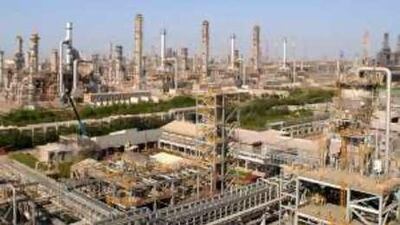NEW DELHI // India's Reliance Industries is set to double its capacity by starting up its new 580,000 barrels per day plant (bpd) this weekend, creating the world's biggest refinery just as global oil demand collapses. The US$6 billion (Dh22.3bn) project will make the oil complex in Jamnagar in western Gujarat the world's single biggest supplier of fuels to the global market, pumping out 1.24 million bpd of ultra-clean fuels to Europe, Africa and the US.
The project is a triumph for the chief executive Mukesh Ambani, who helped break India's heavy reliance on imported fuel a decade ago with Reliance's first 660,000 bpd plant, a huge money-spinner for the firm during a profit boom over the past four years. Industry sources said it appeared likely the company would announce the refinery's commissioning within the next week, just in time for its year-end target, although the announcement may be little more than a formality since it will take months to get the full plant running.
For tax reasons it is not expected to begin significant exports until April, when the new fiscal year begins in India. "Pre-commissioning activities are almost over. We hope to announce start up of the refinery on Dec 28," a company official said, declining to be identified because of company policy. Sunday is also the birthday of the late Dhirubhai Hirachand Ambani, Mr Ambani's father and founder of the Reliance group, who turned his textile firm into a petrochemical and telecommunications conglomerate and India's biggest private company.
While the new refinery's low cost, high sophistication and global reach mean it should turn a profit by crowding out less-efficient export-oriented rivals in Europe or Asia, it enters a market utterly different than Mr Ambani would have envisioned three-and-a-half years ago when he unveiled the project. Run by subsidiary Reliance Petroleum, in which Chevron holds a 5 per cent stake, the refinery will at a stroke more than satisfy the world's additional oil product demand next year, if indeed the International Energy Agency's forecast is not further cut by a deep global recession.
It is not a circumstance Mr Ambani will relish, but it is also not one that will be unfamiliar. "When in 1999 we started our first refinery at Jamnagar, we saw a recession globally and when we are about to start our second refinery, history is repeating itself," he said last month. Reliance has already missed a series of ambitious internal targets to launch the new refinery as early as July, but seems to have accelerated efforts recently.
The Jamnagar local government this month issued a "no-objection certificate" for Reliance to enable it to get a licence from the Commissioner of Explosives, which is required to start the new refinery.Unlike a decade ago, when Reliance built its refinery to tap into India's growing demand for refined fuels, the new plant is geared entirely to the export market, avoiding the domestic market where the government still controls prices.
But the global refining industry has also changed as a surge in oil prices to nearly $150 a barrel in July and the worst financial crisis in nearly a century reverses steadily rising oil demand in the US, Europe and even China. Analysts at Credit Suisse warn that the refining sector is exiting its golden age and entering the "Dark Ages", as China builds new plants quickly enough to meet its own demand while India and the Middle East vie for shrinking export markets.
But Reliance is better placed than most to ride out the downturn, with a strategic position near Middle East crude supplies and an unrivalled capacity and complexity. "It is basically a US Gulf Coast refinery that was built in India," says Al Troner, the managing director of Asia Pacific Energy Consulting. "It is capable of producing large volumes of top-quality product suitable for any market in the world."
It is expected to play a swing supply role that will redraw traditional trade flows and has already embarked on a robust marketing campaign in Europe, Mexico, East Africa and Asia, capitalising on delays and cost overruns faced by other big refinery projects. Reliance has already leased clean oil products storage tanks in Singapore, the Mediterranean and Caribbean to boost its trading operations, according to industry sources.
* Reuters

